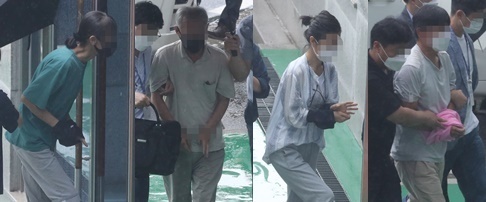Civic activists detained last week for allegedly receiving orders from Pyongyang to organize protests against the purchase of F-35A stealth fighters from the US had received at least $20,000 from North Korean agents for their operation, warrant applications by the authorities showed.
The National Intelligence Service and the police searched the homes of four activists in Cheongju, North Chungcheong Province, in May and found USB flash drives containing encrypted files of orders and reports they exchanged with North Korean agents, according to news reports.
Investigators found that the two men and two women received instructions from members of the North’s espionage department to win over some 60 politicians, labor and civic group members in the Cheongju area to engage a campaign against the purchase of stealth fighters.
The reports included photos of pledges of allegiance to North Korean leader Kim Jong-un written in blood, and recent activities in the minor leftist Minjoong Party and the Korean Confederation of Trade Unions.
The activists are charged with violation of the National Security Act, which incriminates a member of an anti-government organization and anyone who receives orders from it, who committed an act to accomplish its purpose (Article 4); anyone who praises, incites or propagates the activities of an anti-government organization (Article 7); anyone who makes contact with a member of an anti-government organization (Article 8); and anyone who provides weapons, money or other convenience to members of an anti-government organization or those who received their orders (Article 9).
Three of the four suspects have been detained on warrants issued by the Cheongju District Court last week, and the one who hasn’t been, surnamed Sohn, claimed that the case was fabricated and that the National Security Act should be abolished.
The four suspects allegedly set up in 2017 an underground group that follows Pyongyang and seeks to overthrow the South Korean system, and were each tasked with indoctrinating child care teachers, nurses, labor union members at a large conglomerate and young people in the North Chungcheong region.
Three months prior to launching the group, one of the detained suspects met with a North Korean agent in Beijing in May 2017, holding a newspaper in his left hand, a water bottle in his right hand, and carrying a black bag on his shoulder, as agreed in advance, according to Yonhap News.
Without greeting, the two walked around a university, several meters apart from each other, and got on a taxi after confirming they weren’t being followed.
Another detained suspect exchanged signals with North Korean agents in the Cambodian capital of Phnom Penh in April 2018, got on separate tuk-tuks and moved to a temple and then to a hotel where they met.
The other detained suspect used a storage locker at a supermarket in Shenyang, China, in November 2019 to receive $20,000 in cash from a North Korean agent.
The North Korean espionage branch, dubbed the Cultural Exchange division of the United Front Department, gave detailed security instructions to the South Koreans such as “buy used computers and other equipment, avoid real name registration and do not leave traces of purchase” and “replace computers every three years, wireless modems, SIM cards and email addresses every six months.”
The main opposition People Power Party accuses the Moon Jae-in administration of complacency in dealing with the North’s espionage, and demanded on Monday that Moon’s office state its position on the case.
Choe Jae-hyung, a presidential contender of the PPP, said on Monday “is there any issue that President Moon thinks is worthy of mentioning?”
About claims that the detained activists had worked in a special advisory body on labor issues for Moon’s election campaign in 2017, the presidential office said earlier it was “not worth mentioning.”
By Kim So-hyun (
sophie@heraldcorp.com)







![[Today’s K-pop] Blackpink’s Jennie, Lisa invited to Coachella as solo acts](http://res.heraldm.com/phpwas/restmb_idxmake.php?idx=644&simg=/content/image/2024/11/21/20241121050099_0.jpg)
